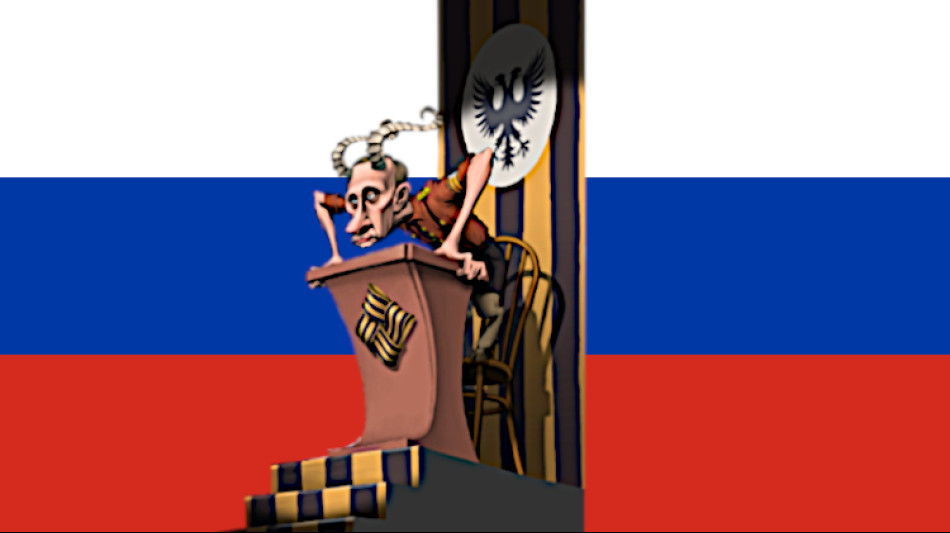-
 Ukraine, Russia, US start second day of war talks
Ukraine, Russia, US start second day of war talks
-
Nepal's youth lead the charge in the upcoming election

-
 Sony hikes forecasts even as PlayStation falters
Sony hikes forecasts even as PlayStation falters
-
Rijksmuseum puts the spotlight on Roman poet's epic

-
 Trump fuels EU push to cut cord with US tech
Trump fuels EU push to cut cord with US tech
-
Fearless talent: Five young players to watch at the T20 World Cup

-
 India favourites as T20 World Cup to begin after chaotic build-up
India favourites as T20 World Cup to begin after chaotic build-up
-
Voter swings raise midterm alarm bells for Trump's Republicans

-
 Australia dodges call for arrest of visiting Israel president
Australia dodges call for arrest of visiting Israel president
-
Countries using internet blackouts to boost censorship: Proton

-
 Top US news anchor pleads with kidnappers for mom's life
Top US news anchor pleads with kidnappers for mom's life
-
Thailand's pilot PM on course to keep top job

-
 The coming end of ISS, symbol of an era of global cooperation
The coming end of ISS, symbol of an era of global cooperation
-
New crew set to launch for ISS after medical evacuation

-
 Family affair: Thailand waning dynasty still election kingmaker
Family affair: Thailand waning dynasty still election kingmaker
-
Japan's first woman PM tipped for thumping election win

-
 Stocks in retreat as traders reconsider tech investment
Stocks in retreat as traders reconsider tech investment
-
LA officials call for Olympic chief to resign over Epstein file emails

-
 Ukraine, Russia, US to start second day of war talks
Ukraine, Russia, US to start second day of war talks
-
Fiji football legend returns home to captain first pro club

-
 Trump attacks US electoral system with call to 'nationalize' voting
Trump attacks US electoral system with call to 'nationalize' voting
-
Barry Manilow cancels Las Vegas shows but 'doing great' post-surgery

-
 US households become increasingly strained in diverging economy
US households become increasingly strained in diverging economy
-
Four dead men: the cold case that engulfed a Colombian cycling star

-
 Super Bowl stars stake claims for Olympic flag football
Super Bowl stars stake claims for Olympic flag football
-
On a roll, Brazilian cinema seizes its moment

-
 Rising euro, falling inflation in focus at ECB meeting
Rising euro, falling inflation in focus at ECB meeting
-
AI to track icebergs adrift at sea in boon for science

-
 Indigenous Brazilians protest Amazon river dredging for grain exports
Indigenous Brazilians protest Amazon river dredging for grain exports
-
Google's annual revenue tops $400 bn for first time, AI investments rise

-
 Last US-Russia nuclear treaty ends in 'grave moment' for world
Last US-Russia nuclear treaty ends in 'grave moment' for world
-
Man City brush aside Newcastle to reach League Cup final

-
 Guardiola wants permission for Guehi to play in League Cup final
Guardiola wants permission for Guehi to play in League Cup final
-
Boxer Khelif reveals 'hormone treatments' before Paris Olympics

-
 'Bad Boy,' 'Little Pablo' and Mordisco: the men on a US-Colombia hitlist
'Bad Boy,' 'Little Pablo' and Mordisco: the men on a US-Colombia hitlist
-
BHP damages trial over Brazil mine disaster to open in 2027

-
 Dallas deals Davis to Wizards in blockbuster NBA trade: report
Dallas deals Davis to Wizards in blockbuster NBA trade: report
-
Iran-US talks back on, as Trump warns supreme leader

-
 Lens cruise into French Cup quarters, Endrick sends Lyon through
Lens cruise into French Cup quarters, Endrick sends Lyon through
-
No.1 Scheffler excited for Koepka return from LIV Golf

-
 Curling quietly kicks off sports programme at 2026 Winter Olympics
Curling quietly kicks off sports programme at 2026 Winter Olympics
-
Undav pokes Stuttgart past Kiel into German Cup semis

-
 Germany goalkeeper Ter Stegen to undergo surgery
Germany goalkeeper Ter Stegen to undergo surgery
-
Bezos-led Washington Post announces 'painful' job cuts

-
 Iran says US talks are on, as Trump warns supreme leader
Iran says US talks are on, as Trump warns supreme leader
-
Gaza health officials say strikes kill 24 after Israel says officer wounded

-
 Empress's crown dropped in Louvre heist to be fully restored: museum
Empress's crown dropped in Louvre heist to be fully restored: museum
-
UK PM says Mandelson 'lied' about Epstein relations

-
 Shai to miss NBA All-Star Game with abdominal strain
Shai to miss NBA All-Star Game with abdominal strain
-
Trump suggests 'softer touch' needed on immigration

Trump’s Crackdown: Lives/Risk
In a dramatic push to tackle the skyrocketing cost of prescription drugs in the United States, President Donald Trump has taken decisive action against the pharmaceutical industry. With the stroke of a pen, he signed an executive order designed to slash drug prices, promising relief for millions of Americans burdened by exorbitant healthcare costs. However, this bold move has sparked fierce debate, with critics warning that the consequences could be catastrophic—potentially costing millions of lives due to drug shortages and stifled innovation.
Trump’s Plan to Lower Drug Prices
The executive order, enacted on May 12, 2025, seeks to align U.S. drug prices with those in other developed nations, where medications often cost a fraction of what Americans pay. Trump has long criticized the pharmaceutical industry for what he calls unfair pricing practices, arguing that U.S. consumers have been overcharged for years. The order aims to reduce prices by 30% to 80%, targeting both brand-name and generic drugs. It relies on voluntary compliance from drug companies, with the threat of future regulations looming if they fail to cooperate. For many patients, this could mean significant savings on medications that currently drain their finances.
The Dark Side: Drug Shortages Loom
While the goal of affordability is laudable, the plan has raised red flags among healthcare experts and industry leaders. One major concern is the risk of drug shortages. The U.S. already faces periodic shortages of critical medications, such as those used in cancer treatments and epidurals. Forcing pharmaceutical companies to lower prices could make it unprofitable to produce certain drugs, particularly low-cost generics. If production slows or stops, hospitals and pharmacies could struggle to secure enough supply, leaving patients without access to life-saving treatments. The ripple effect could be devastating, especially for vulnerable populations like cancer patients and the elderly.
A Blow to Innovation
Beyond immediate supply issues, the executive order could deal a severe blow to pharmaceutical innovation. Developing new drugs is an expensive and risky endeavor, often costing billions of dollars and taking years of research. The U.S. market, with its higher drug prices, has long been a key source of revenue for this work. If that revenue shrinks, companies may cut back on research and development, slowing the creation of new treatments for diseases like Alzheimer’s, cancer, and rare genetic disorders. A healthcare economist recently cautioned that such a move could “delay breakthroughs that millions of patients are counting on,” trading short-term savings for long-term losses in medical progress.
Economic Fallout
The economic implications are equally troubling. The pharmaceutical industry employs thousands of Americans and drives significant investment in the U.S. economy. Lower prices could lead to job cuts and reduced funding for new projects. One major drug company has already hinted at rethinking its $50 billion investment in the U.S. if the order takes full effect. While consumers might save money at the pharmacy, the broader economy could suffer as a result.
The Case for Change
Despite these risks, supporters argue that action is overdue. Prescription drug prices in the U.S. are nearly three times higher than in other advanced countries, forcing many Americans to ration their medications or skip doses entirely. Lowering prices could save billions of dollars and improve access for those with chronic conditions like diabetes or heart disease. For these patients, Trump’s order represents a lifeline—a chance to afford the drugs they need to survive.
A High-Stakes Gamble
As the dust settles, the debate rages on. Will Trump’s crackdown on the pharmaceutical industry deliver on its promise of affordable healthcare, or will it unleash a cascade of unintended consequences? The order’s success hinges on cooperation from an industry reluctant to sacrifice profits, and its failure could leave patients paying the ultimate price. For now, the nation watches as this high-stakes gamble unfolds, with millions of lives in the balance.

Israel in the fight against the terror scum of Hamas

Italy: Storm Ciarán brings disastrous record rainfall

What remains of the EU leader's visit to Kiev?

Gaza: Hamas terrorists responsible for expulsion

Vice-Chancellor Habeck: Empty words without action?

Israel: More bodies, weeks after Hamas terror attack

Israel politician threatens russian terror state on Russian TV

EU: No agreement on 10-year extension for glyphosate

Ukraine: When will the world stand up to Russian terror?

Warming: Methane levels rising, is this nature's answer?

Israel has every right to destroy Hamas and Hezbollah!




